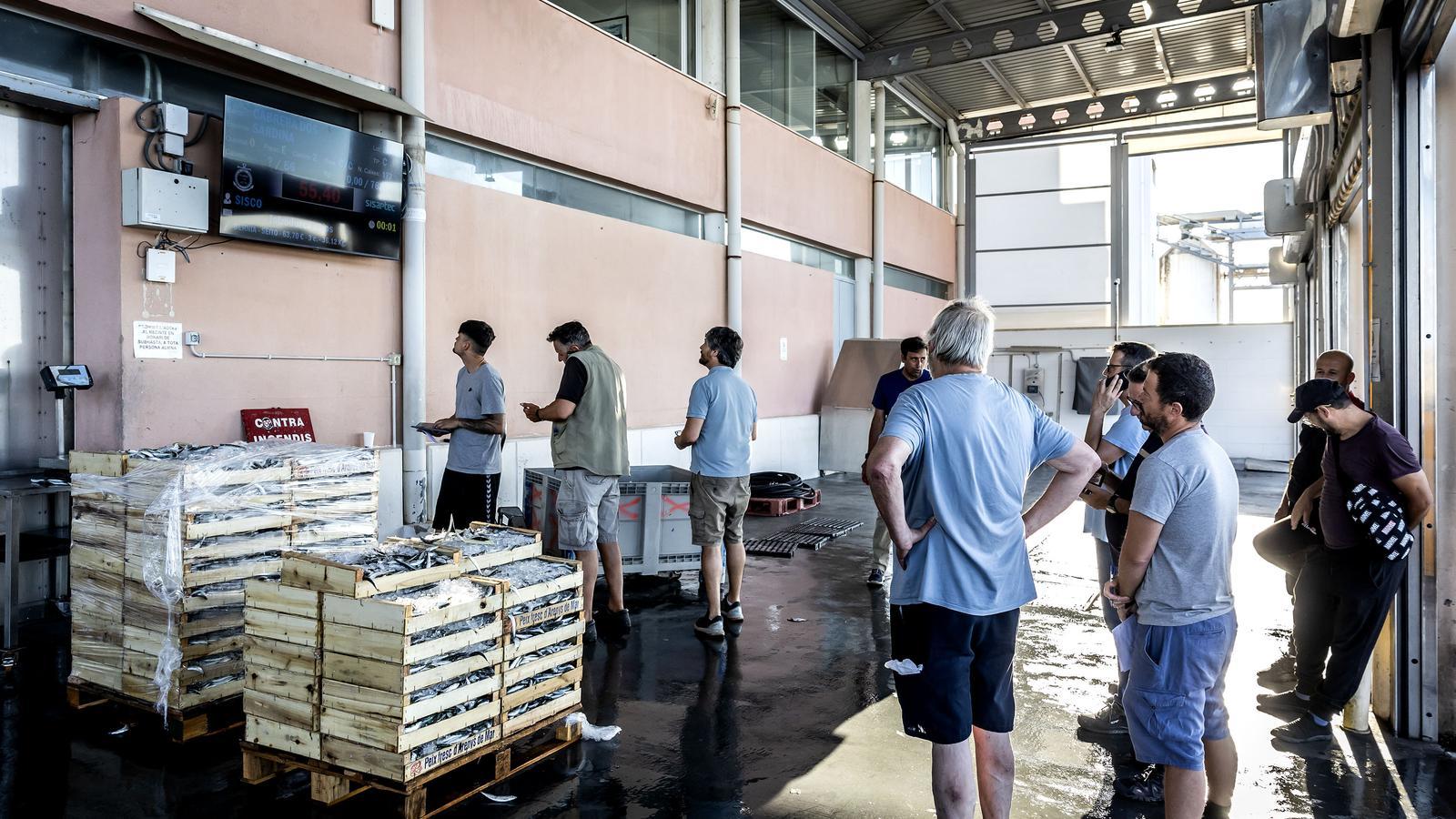In 2024, Mercabarna sold almost 50,000 kilos of sardines from Catalan ports, a figure that contrasts with the nearly 900,000 sold from ports outside Catalonia. The difference in figures is not only with sardines, but also with other bluefish, such as horse mackerel, mackerel, tuna, and sardines. For example, last year Mercabarna sold a total of 8,760 kilos of sardines caught in Catalan ports, while more than 29,000 kilos were sold from other ports.
Silent and on foot: this is the bluefish auction in Vilanova i la Geltrú
We spent a morning among fishermen, wholesalers and buyers who shared the freshly caught product.


Vilanova i la GeltrúIt's eight o'clock in the morning on a Friday with a good summer sea, and the bluefish boats, which have been working in the darkness, have already unloaded the crates of sardines and anchovies at the fishing dock. They arrived punctually, around 7:30 a.m., and even more punctual is the flat screen, like a television, that has quickly switched on on the dock itself. The screen shows the auction price for the crates. No one is calling out their prices, no voices are raised saying "I'll take these." There is only silence and cell phones. And a strong smell of the salty sea, mingling with that of the fresh sardines sticking out of the crates.
The auction is held standing up, with the buyers (today there are seven) standing in a semicircle around the boxes of sardines, each weighing twelve kilos, stacked one on top of the other, and an atmosphere of restrained calm reigns. Calm because there is silence; restrained because everyone is in a hurry; there is a lot of work to be done, because after the sardines are purchased, the wholesalers and fishmongers will have to transport them to another location, which could be in the Vilanova i la Geltrú market itself or many miles away. Let's say it all, because Vilanova's catch is prestigious and reaches Galicia, Zaragoza, Madrid, and other cities.
But back to the fishing dock. We're back in front of the flat screen. They either like the sardines or not. "They have a device in their hand that they can use to stop the screen, which shows the batch of sardines and the price; when they stop it, they have one minute to decide whether to keep it," he continues. He stopped the auction, looked at his phone, and decided not to keep the batch, so the sale continues. There are now 45 boxes of sardines for sale, and the price has dropped: they're selling for 52.70 euros.
We look at the scoreboard on the screen again, and now it shows 48.90 euros. A wholesaler, whom everyone knows because they called me by name, has stopped it. He takes 43 boxes of sardines at once for 48.90 euros; not 46 as it was at the beginning, because someone had stopped the scoreboard up to three times before.
The port workers take the sardines inside the market, to a handling area, where we'll go later to see how they prepare the boxes for buyers to load onto their trucks. Now, in front of the screen, boxes with eight pieces of figs have been placed, which have suddenly sold out in the blink of an eye. I haven't had time to observe who got them because everything happened so quickly.
At 8:23 a.m. the auction ended, there were no more bluefish to sell, so we entered the handling room. The same port, because the port of Vilanova has an ice factory. And what ice! They make it with exactly the necessary strength to keep the fish, but not too solid or too frozen, otherwise it would burn the product. He has been on the family boat for sixteen years, and took over as skipper in 2016. I ask him about the few boxes of sardines I've seen today.
Times have changed; sardines are sold for more than anchovies; and lately they're small, very small, because they have difficulty feeding; they have small mouths, says the head skipper. There are about fifty boats in the port of Vilanova, and others are moored because there are no fishermen. In Sitges, in the summer, there's only one, and if it enters the port by vehicle, instead of by boat, then it will be the last one at the auction. If fishermen enter the port of Vilanova by boat, they take numbers like any other boat that has stopped. "We had to set rules because everyone wants to be treated equally, and we believe that's the way to achieve that," says Carnicer.
Leaving aside the rules, we return to oily fish, which requires schedules that disrupt people's usual rhythms: the boats leave around 11 p.m. and return early in the morning. They spend the whole night fishing to catch a few oily fish, which is what has happened in recent days, but it shouldn't always be that way. And yet the port of Vilanova is second in Catalonia in catches of all species. Finally, a note that explains the larger pattern and is an example of how fish sales and consumption mechanisms operate today: "We Catalans like to eat large sardines, and if they're large, they probably weren't caught in our ports, because ours are small; on the other hand, in Galicia, they like them small." Thus, Catalan sardines, for the most part, end up in Galicia, while those from Galicia reach our country. Be that as it may, there are fishmongers in Vilanova, such as Peces Dolores, which sells fish from the Vilanova fish market, and which clearly marks it on the boxes it sells (and these are indications required by law).
